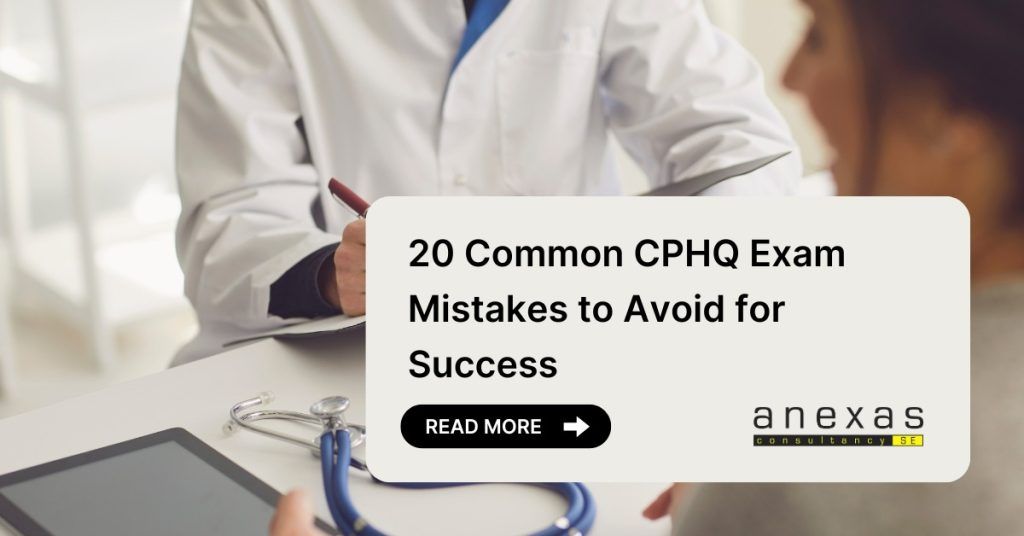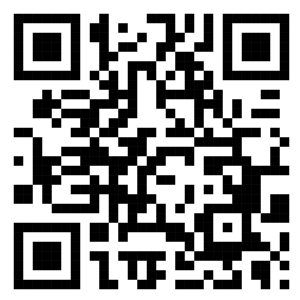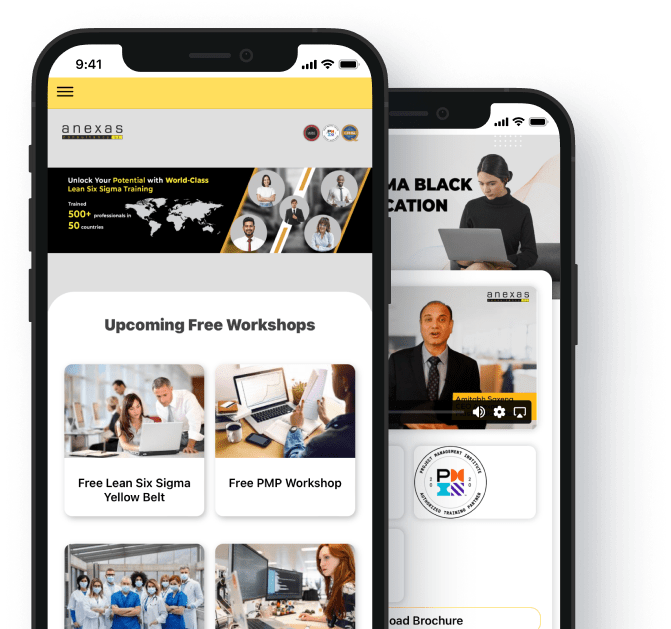Table of Contents
Share This Article
20 Common CPHQ Exam Mistakes to Avoid for Success
- 29816 views
Introduction
Overview of the CPHQ Exam and Its Significance
The Certified Professional in Healthcare Quality (CPHQ) exam is a globally recognized certification that validates an individual’s expertise in healthcare quality, patient safety, performance improvement, and risk management. Earning the CPHQ credential demonstrates a strong commitment to enhancing healthcare systems, improving patient outcomes, and implementing best practices in quality management. As the healthcare industry continues to evolve with new regulations and standards, professionals with CPHQ certification stand out in the job market, gaining a competitive edge in roles related to quality assurance, accreditation compliance, and healthcare analytics. However, while the benefits of achieving CPHQ certification are substantial, the path to passing the exam is not without challenges. Many candidates face CPHQ test preparation mistakes that can negatively impact their performance, leading to unnecessary retakes and delays in career progression.
Why Avoiding Common Mistakes is Crucial for Success
Avoiding common CPHQ exam mistakes to avoid is essential for anyone aiming to pass the exam on the first attempt. The CPHQ test is not just about memorizing concepts but also applying knowledge to real-world healthcare scenarios. Candidates who fall into CPHQ study plan mistakes—such as relying on outdated materials, neglecting mock exams, or failing to manage time effectively—often struggle with the exam’s complexity. One of the top reasons candidates fail the CPHQ exam is a lack of familiarity with the types of questions asked, particularly those requiring analysis and decision-making skills. Additionally, CPHQ exam pitfalls and how to avoid them include failing to develop a structured study plan, underestimating the weight of certain topics, and not practicing enough scenario-based questions. By understanding CPHQ certification study mistakes, candidates can enhance their preparation and significantly improve their chances of passing on the first try.
Structure of the CPHQ Exam
The CPHQ exam consists of multiple-choice questions divided into three cognitive levels: recall, application, and analysis. This means that candidates must not only remember key facts but also apply them to problem-solving and critical-thinking scenarios. Many candidates make CPHQ test prep dos and don’ts errors by focusing too much on memorization and neglecting the application-based aspects of the test. The exam is structured around four key domains: Organizational Leadership, Health Data Analytics, Performance and Process Improvement, and Patient Safety. Understanding the distribution of topics and their relative importance is crucial in avoiding CPHQ certification pitfalls to watch out for. Furthermore, test-takers should be aware of CPHQ exam readiness mistakes, such as poor time management during the exam, second-guessing correct answers, and failing to utilize review techniques effectively. Implementing strong CPHQ test-taking strategies for success, including practicing with mock exams, using official study guides, and engaging in active learning techniques, can make a significant difference in performance.
By addressing CPHQ exam challenges and solutions and following proven CPHQ exam success tips and strategies, candidates can avoid the biggest mistakes in CPHQ certification and position themselves for success. This guide will cover the most common errors in CPHQ certification preparation, offering practical insights on how to pass CPHQ without common mistakes and ensure a smooth certification journey.

Pre-Exam Preparation Mistakes
Proper preparation is the foundation of success in the CPHQ exam. Many candidates make common CPHQ exam mistakes to avoid, leading to unnecessary struggles and lower chances of passing. Understanding the CPHQ exam errors to prevent is crucial for developing an effective study plan and maximizing efficiency. Below are some of the most critical mistakes that first-time test-takers often make, along with strategies to overcome them.
Lack of Understanding of the Exam Structure
One of the biggest mistakes in CPHQ certification is not fully grasping the exam format. The test consists of multiple-choice questions categorized into three cognitive levels: recall, application, and analysis. Many candidates focus too much on memorizing facts rather than learning how to apply them in practical scenarios. CPHQ exam pitfalls and how to avoid them include neglecting scenario-based questions, which require analytical thinking rather than simple recall. Candidates must also avoid underestimating the difficulty of the application and analysis questions, as these are designed to assess real-world decision-making skills rather than rote memorization.
Study Strategy Mistakes
Developing an effective study strategy is essential for success in the CPHQ exam. However, many candidates make common CPHQ exam mistakes to avoid, which can lead to inefficient preparation and lower scores. Understanding CPHQ exam errors to prevent helps in designing a well-structured study plan that maximizes retention and application of concepts. Below are some of the biggest mistakes in CPHQ certification preparation and how to fix them.
Ignoring Real-World Application of Concepts
One of the most frequent CPHQ exam pitfalls and how to avoid them involves memorizing information without understanding how it applies to real-world healthcare quality scenarios. The CPHQ exam is not just about recalling facts—it requires candidates to analyze process improvement methods, patient safety protocols, and performance measurement strategies in a healthcare setting. Candidates who focus solely on rote memorization often struggle with scenario-based questions, which test the ability to apply concepts rather than just recognize them. CPHQ test preparation mistakes include failing to use case studies, process improvement examples, and accreditation guidelines to reinforce learning. A strong study plan should incorporate real-life healthcare quality scenarios to better understand concepts and improve problem-solving skills.
Focusing Only on One Learning Style
Many candidates limit themselves to a single study method, such as reading textbooks, without leveraging other resources. CPHQ exam challenges and solutions involve recognizing that people learn in different ways, and using multiple learning techniques enhances comprehension. Candidates who rely only on reading often struggle with application-based questions because they fail to engage in active learning techniques. How to pass CPHQ without common mistakes includes using a combination of:
- Videos and online courses for visual learners.
- Interactive quizzes and flashcards for active recall.
- Discussion groups and study partners for reinforcing difficult topics.
- Case studies and practical exercises to simulate real-world healthcare scenarios.
By diversifying study methods, candidates can avoid CPHQ study plan mistakes and ensure better retention of critical concepts.
Not Managing Study Time Effectively
Poor time management is one of the top reasons candidates fail the CPHQ exam. Many candidates spend excessive time on familiar topics while neglecting weaker areas. Others procrastinate and rush through content in the final weeks before the exam, leading to information overload and stress. CPHQ exam success tips and strategies recommend setting up a structured study schedule that includes:
- A balanced approach to covering all exam domains based on weightage.
- Short, focused study sessions with regular breaks to enhance retention.
- A review plan that includes periodic self-assessment to track progress.
Avoiding common errors in CPHQ certification preparation means planning ahead and ensuring that all content areas are covered systematically.
Not Practicing Time Management for the Exam
Time management during the actual exam is just as critical as preparation. A major CPHQ exam readiness mistake is spending too much time on difficult questions, leaving less time for easier ones. Candidates who fail to practice time allocation strategies may struggle to complete all questions within the allotted time. What not to do when preparing for CPHQ includes:
- Not practicing timed mock exams, which can lead to difficulty managing pace on test day.
- Taking too long on a single question instead of moving forward and returning to it later.
- Failing to use the “answer easier questions first” strategy, which helps build confidence and ensures scoring on the more straightforward items.
A smart CPHQ test-taking strategy for success includes taking full-length practice exams under timed conditions to develop better pacing. Candidates should also practice eliminating incorrect answer choices quickly to increase efficiency during the exam.
By avoiding these CPHQ certification study mistakes and implementing structured preparation techniques, candidates can increase their chances of passing the CPHQ exam without unnecessary setbacks. CPHQ test prep dos and don’ts emphasize strategic learning, time management, and real-world application to ensure success.
Exam Day Mistakes
Exam day can be stressful, and even well-prepared candidates may make common CPHQ exam mistakes to avoid if they are not mindful of their approach. Understanding CPHQ exam errors to prevent is essential for maintaining focus and ensuring a smooth test-taking experience. Many candidates lose marks due to avoidable errors that stem from anxiety, poor time management, and misinterpretation of questions. Below are some of the biggest mistakes in CPHQ certification and how to avoid them.
Not Reading Questions Carefully
One of the most frequent CPHQ exam pitfalls and how to avoid them involves misreading or rushing through questions. Many questions in the CPHQ exam contain keywords such as “best,” “most likely,” or “except”, which can completely change the meaning of the question. Candidates who skim through questions too quickly often misinterpret key concepts and select incorrect answers. CPHQ test preparation mistakes include failing to practice reading comprehension and not taking the time to analyze each question properly. To avoid this:
- Read every word carefully, paying attention to qualifiers like “always,” “never,” and “except.”
- Review all answer choices before selecting the best one.
- Practice answering sample questions deliberately to develop a habit of careful reading.
Understanding question wording is crucial to avoiding CPHQ exam challenges and solutions related to test-day misinterpretation.
Second-Guessing Too Many Answers
Another CPHQ exam readiness mistake is overanalyzing and second-guessing answers. Many candidates doubt their initial response and change it unnecessarily, leading to lower scores. Studies show that first instincts are often correct unless there is a clear reason to change an answer. What not to do when preparing for CPHQ includes excessive overthinking, which can result in unnecessary errors. To avoid this mistake:
- Trust your instincts if you were confident in your first choice.
- Avoid changing answers without a valid reason (e.g., recognizing a misinterpretation).
- Develop confidence in your knowledge by practicing timed exams and reviewing correct answers.
Avoiding this habit is one of the key CPHQ test-taking strategies for success and ensures candidates don’t lose points due to uncertainty.
Neglecting the Flag and Review Strategy
Many candidates make the CPHQ certification study mistakes of wasting too much time on difficult questions instead of marking them for later review. The CPHQ exam allows candidates to flag questions, enabling them to return to them after answering the easier ones. A common CPHQ test prep dos and don’ts is to not get stuck on a single question for too long. Effective strategies to avoid this mistake include:
- Answering the easier questions first to build confidence.
- Flagging difficult questions and coming back to them later with a fresh perspective.
- Using remaining time to carefully review flagged questions before submitting the exam.
Proper time allocation techniques help in overcoming CPHQ certification pitfalls to watch out for and ensuring a well-managed test experience.
Poor Stress and Anxiety Management
One of the top reasons candidates fail the CPHQ exam is letting exam anxiety impact performance. Stress can lead to mental blocks, misreading questions, and rushed decision-making. Managing stress effectively is a crucial CPHQ exam success tip and strategy. Some common errors in CPHQ certification preparation related to stress include:
- Not practicing relaxation techniques, such as deep breathing or mindfulness, before and during the exam.
- Allowing anxiety to disrupt focus, leading to mistakes.
- Lack of positive self-talk, which can increase self-doubt and second-guessing.
To avoid this, candidates should practice stress management techniques before the exam and stay calm under pressure.
Not Taking Breaks Strategically
Ignoring scheduled breaks is another CPHQ exam mistake first-timers make. The CPHQ exam is lengthy, and mental fatigue can lead to poor concentration and errors. Candidates often overlook breaks, thinking they can power through the exam, but this leads to decreased focus and efficiency. Some CPHQ exam prep strategy mistakes include:
- Not utilizing the built-in breaks, leading to exhaustion.
- Failing to use short mindfulness techniques to reset focus.
- Not hydrating or stretching, which can improve concentration.
Taking strategic breaks helps refresh the mind, reducing errors and increasing accuracy. This is one of the most effective CPHQ exam tips to avoid failure.
By understanding these CPHQ certification pitfalls to watch out for, candidates can improve their exam-day performance and maximize their chances of success. Implementing CPHQ test-taking strategies for success ensures a structured approach, reduces stress, and helps in achieving a passing score on the CPHQ exam without unnecessary mistakes.
Post-Exam Mistakes
Many candidates assume that once they finish the CPHQ exam, their work is done. However, post-exam mistakes can significantly impact future success and professional growth. Whether a candidate passes or fails, understanding common CPHQ exam mistakes to avoid after the test is crucial for career advancement. Many CPHQ exam errors to prevent involve failing to analyze performance, ignoring learning opportunities, and not leveraging certification effectively. Below are some of the biggest mistakes in CPHQ certification and strategies to avoid them.
Not Reviewing Performance if Unsuccessful
One of the most critical CPHQ exam pitfalls and how to avoid them is failing to review performance after an unsuccessful attempt. The National Association for Healthcare Quality (NAHQ) provides a performance report, which highlights strengths and weaknesses in different knowledge areas. Many candidates ignore this valuable resource, leading to repeated mistakes in CPHQ test preparation mistakes. To overcome this:
- Carefully analyze the NAHQ performance report to identify weak areas.
- Adjust study strategies accordingly, focusing more on lower-scoring sections.
- Seek additional resources or mentorship to strengthen knowledge gaps.
Failing to review performance is a major contributor to CPHQ exam challenges and solutions candidates face when preparing for a retake.
Not Learning from the Experience
Another CPHQ exam readiness mistake is failing to learn from past experiences. Many candidates repeat the same study mistakes without refining their approach. What not to do when preparing for CPHQ includes ignoring feedback from peers or study groups who have successfully passed. Common CPHQ certification study mistakes include:
- Using the same ineffective study methods without modification.
- Not joining study groups or peer discussions to gain fresh perspectives.
- Failing to implement feedback from mentors or experienced professionals.
To enhance CPHQ test-taking strategies for success, candidates should continuously refine their preparation based on past performance and expert guidance.
Assuming Certification Alone is Enough for Career Growth
One of the top reasons candidates fail CPHQ exam preparation is assuming that simply passing will automatically advance their careers. While certification is a valuable credential, failing to leverage it effectively is a common CPHQ exam success tip and strategy that many overlook. Some common errors in CPHQ certification preparation include:
- Not updating resumes or LinkedIn profiles to reflect the new credential.
- Failing to network within healthcare quality communities to explore job opportunities.
- Not engaging in continuous learning to stay updated on healthcare quality trends.
To avoid these CPHQ test prep dos and don’ts, candidates should actively seek professional development opportunities, attend industry events, and apply their knowledge in real-world scenarios.
Failing to Stay Updated on Continuous Learning
The healthcare quality industry is constantly evolving, and one of the CPHQ certification pitfalls to watch out for is neglecting continuous learning. Some candidates pass the exam but do not stay informed about new industry standards and best practices. CPHQ exam tips to avoid failure include:
- Joining professional organizations to stay updated on industry trends.
- Pursuing additional certifications or training relevant to healthcare quality.
- Engaging in continuing education to maintain and enhance expertise.
By avoiding these CPHQ exam mistakes first-timers make, professionals can maximize the value of their certification and enhance their long-term career prospects.
Addressing these CPHQ exam prep strategy mistakes ensures that candidates not only pass the exam but also capitalize on their certification for career advancement. Understanding how to pass CPHQ without common mistakes requires a commitment to post-exam reflection, continuous improvement, and strategic career planning.
Conclusion
Achieving the Certified Professional in Healthcare Quality (CPHQ) certification requires more than just studying hard—it demands a strategic approach, effective time management, and awareness of common pitfalls. Many candidates struggle not because they lack knowledge but due to avoidable errors in study strategies, exam day execution, and post-exam planning. By understanding the common CPHQ exam mistakes to avoid, candidates can significantly improve their chances of passing on the first attempt.
One of the biggest mistakes in CPHQ certification is focusing only on memorization rather than applying concepts to real-world healthcare quality scenarios. Candidates should prioritize active learning through case studies, discussions, and interactive resources to reinforce their understanding. Additionally, poor time management—both during preparation and the exam—can lead to rushed studying, incomplete coverage of key topics, and inefficient answering strategies on test day.
Exam day itself presents unique challenges, including misreading questions, second-guessing answers, and letting stress impact performance. To overcome these CPHQ exam pitfalls and how to avoid them, candidates should practice stress management techniques, use time allocation strategies, and follow a structured approach to answering questions.
Even after the exam, some candidates fail to analyze their performance or leverage their certification effectively. Those who do not pass must review their NAHQ performance report and adjust their study plan instead of repeating the same mistakes. For those who pass, maximizing the value of their certification through networking, continuous learning, and career development is essential.
Ultimately, the top reasons candidates fail the CPHQ exam often come down to poor planning, ineffective study methods, and exam-day anxiety. However, with CPHQ exam success tips and strategies, candidates can navigate these challenges, optimize their preparation, and confidently achieve certification. By staying disciplined, strategic, and proactive, healthcare professionals can not only pass the CPHQ exam but also use their certification to advance their careers and contribute meaningfully to healthcare quality improvement.
Frequently Asked Questions (FAQs) About the CPHQ Exam
What is the CPHQ exam, and who should take it?
The Certified Professional in Healthcare Quality (CPHQ) exam is a globally recognized certification for professionals in healthcare quality, patient safety, and performance improvement. It is ideal for quality managers, healthcare administrators, nurses, risk managers, and other professionals involved in healthcare quality improvement.
What are the main topics covered in the CPHQ exam?
The CPHQ exam covers four key domains:
Organizational Leadership
Health Data Analytics
Performance and Process Improvement
Patient Safety and Quality Measurement
Each domain has specific competencies and contributes to the overall CPHQ exam blueprint.
What is the format of the CPHQ exam?
The exam consists of 140 multiple-choice questions, of which 125 are scored, and 15 are pretest questions that do not count toward the final score. Questions fall into three categories:
Recall (simple knowledge-based questions)
Application (applying concepts to scenarios)
Analysis (evaluating complex healthcare quality situations)
What is the passing score for the CPHQ exam?
The passing score is not fixed; it is determined using a criterion-referenced scoring method, meaning candidates must meet a predefined standard rather than compete with others. The passing score generally falls between 72% and 74%.
How should I prepare for the CPHQ exam?
Successful candidates use a combination of official NAHQ study materials, online courses, question banks, practice exams, and study groups. It’s important to align study efforts with the NAHQ exam content outline and avoid common CPHQ exam mistakes to avoid, such as using outdated study materials or ignoring high-weighted topics.
How long should I study for the CPHQ exam?
Most candidates study for 2 to 4 months, depending on their experience and familiarity with healthcare quality concepts. A structured study plan with practice tests, active recall, and real-world case studies is essential for success.
What are the biggest mistakes in CPHQ certification preparation?
Some common mistakes include:
Underestimating scenario-based questions
Focusing too much on memorization instead of application
Not taking full-length timed practice tests
Ignoring the latest updates in healthcare quality standards
Not managing exam time effectively
What happens if I fail the CPHQ exam?
If you do not pass, you can retake the exam after a 90-day waiting period. NAHQ provides a performance report to help identify weak areas. Candidates should revise their study strategy and focus on CPHQ exam pitfalls and how to avoid them for a better chance of success.
How long is the CPHQ certification valid?
The CPHQ certification is valid for two years. To maintain certification, professionals must earn 30 continuing education (CE) credits during the recertification period and submit them to NAHQ.
How can I use the CPHQ certification to advance my career?
Earning the CPHQ certification enhances career opportunities in healthcare quality, patient safety, and performance improvement roles. Certified professionals often gain higher salaries, leadership positions, and greater credibility within healthcare organizations. However, continuing education and staying updated on industry trends are crucial for long-term career growth.
CPHQ Certification Training Course
- 28 hrs live training + 2 live projects
- 10+ complementary courses






